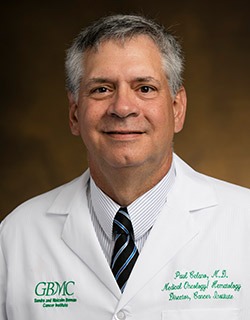Dr. Celano discusses kidney, prostate, and bladder cancer
November 6, 2017In this Facebook Live event, Paul Celano, MD, FACP, FASCO, Herman and Walter Samuelson Medical Director of the Sandra and Malcolm Berman Cancer Institute at GBMC and ABC2's Ashley James discuss genitourinary cancers (cancers of the bladder, prostate, and kidney).
Dr. Celano provides important answers to burning questions posed by GBMC Facebook followers, explaining that genitourinary cancers are, in fact, prevalent in both men and women. Prostate cancer, for example, ranks as the number one cancer in men.
For patients with these diseases, Dr. Celano states that GBMC has an entire team dedicated to the care of each individual. “Thanks to the multidisciplinary cancer care team at GBMC, patients are assured that their issues are being discussed and thought about by many specialists, not just one doctor. From a medical oncologist, urologist, surgeon, and radiation oncologist, to a radiologist, clinical research department, and social support network, we have an entire team dedicated to doing the very best for patients every day.”
Dr. Celano and Ashley James discuss several important questions during this special segment, including:
- What are the symptoms of the different types of genitourinary cancers, and how do I know when to seek the care of a physician for symptoms?
- Why is smoking such a major risk factor for bladder cancer?
- Did you know that family history of cancer is a risk factor that shouldn’t be ignored?
- What are clinical trials and how does research benefit cancer care and treatment?
- What’s the deal with cancer screening and guidelines for when men and women should be screened, specifically the PSA test for prostate cancer?
- If cancer is diagnosed, what is next for me or my loved one?
- How is prostate cancer treated? Is surgery the only treatment, and what is active surveillance?
- Can prostate cancer be prevented?
Tune into this important discussion about genitourinary cancers in men and women to hear Dr. Celano talk about the prevalence of these diseases in an aging population, new treatment options, and the hope that GBMC’s multidisciplinary approach to cancer care is providing more patients throughout the community.




